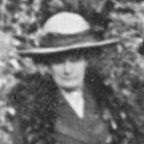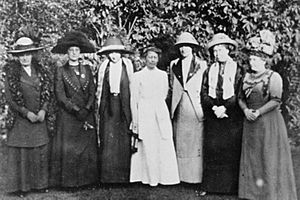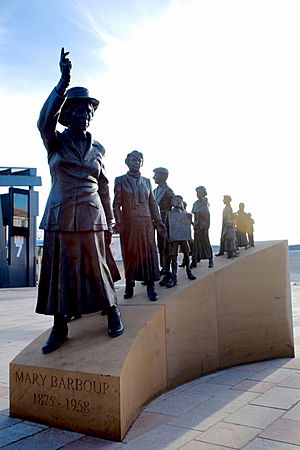Helen Crawfurd facts for kids
Quick facts for kids
Helen Crawfurd
|
|
|---|---|
 |
|
| Born |
Helen Jack
9 November 1877 Glasgow, Scotland
|
| Died | 18 April 1954 (aged 76) Dunoon, Scotland
|
| Nationality | Scottish |
| Occupation | Politician, activist, suffragette |
| Spouse(s) | Alexander Montgomerie Crawfurd George Anderson |
Helen Crawfurd Anderson (born November 9, 1877 – died April 18, 1954) was an important Scottish activist. She fought for women's right to vote as a suffragette. Helen also helped organize rent strikes and was a Communist politician. She was born in Glasgow, Scotland, and grew up there and in London.
Contents
Helen's Early Life and Family
Helen was born Helen Jack in Glasgow. Her parents were Helen L Kyle and William Jack. Her mother worked with a steam-loom before she got married.
When Helen was young, her family moved to Ipswich. She went to school in London and Ipswich. Later, as a teenager, she moved back to Glasgow. Helen's father was a baker. He was a Catholic but later joined the Church of Scotland. He also became a trade union member.
Helen was religious when she was young. She even taught Sunday School. At age 21, she married Alexander Montgomerie Crawfurd. He was a Church of Scotland minister and a family friend. Alexander was 67 years old when they married. He became more radical in his views over time. Alexander died in Glasgow when he was 85.
In 1944, Helen married again. Her second husband was George Anderson. He was a member of the Communist Party of Great Britain. George died in 1952. Helen Crawfurd died two years later in Dunoon, Scotland, at age 76.
Helen's Political Work
Helen Crawfurd became active in the women's suffrage movement around 1900. This movement worked to get women the right to vote. In 1910, she joined a meeting in Rutherglen.
Fighting for Women's Rights
Helen was sent to jail three times for her strong protests. In 1912, she broke windows of the Minister for Education. She was jailed for one month for this act of protest. In March 1914, she was arrested in Glasgow. This happened when Emmeline Pankhurst, another famous suffragette, was speaking. Helen was jailed for another month and went on an eight-day hunger strike. This meant she refused to eat in prison as a protest.
After another arrest, Helen left the Women's Social and Political Union (WSPU). She disagreed with their support for World War I. In 1914, she joined the Independent Labour Party (ILP).
Wartime Activism and Rent Strikes
During World War I, Helen was part of the Red Clydeside movement. This movement involved many workers and activists in Glasgow. She was very involved in the Glasgow rent strikes in 1915. She led the South Govan Women's Housing Association. This group fought against unfair rent increases and tried to stop people from being evicted. She worked with other strong women like Mary Barbour and Agnes Dollan.
Helen also helped start the Glasgow branch of the Women's International League for Peace and Freedom. She became the secretary of the the Women's Peace Crusade. On July 23, 1916, Helen organized the first protest for the Women's Peace Crusade. About 5,000 people attended this event. She also started a branch of the United Suffragists in Glasgow.
Joining the Communist Party
In 1918, Helen was chosen as vice-chair of the Scottish division of the Independent Labour Party (ILP). She was known as a very good speaker. Soon after, she helped start a group within the ILP. This group wanted the ILP to join the Communist International.
In 1920, Helen traveled to Moscow. She went for a big meeting called the Congress of the Third Communist International. There, she met and interviewed Vladimir Lenin, a very important leader. When the ILP decided not to join the Communist International, Helen joined the new Communist Party of Great Britain (CPGB). She served on its main committee. She also worked on different writing projects and became secretary of Workers International Relief.
In 1919, Helen was a delegate to a meeting of the Women's International League for Peace and Freedom in Zürich.
Later Political Career
In 1921, Helen Crawfurd ran for election in Glasgow's Govan ward. She was the first Communist Party candidate there.
In 1927, Helen was an official delegate to a conference in Brussels. This conference was against oppressed nations. The League against Imperialism was started there, and Helen joined its British executive committee.
Helen ran for Parliament for the CPGB in Bothwell in 1929. She also ran in Aberdeen North in 1931. However, she was not elected in either election.
In the 1930s, Helen was active in the Friends of the Soviet Union group. She tried to get elected to the Dunoon Town Council in 1938 but did not win. However, after the war, she was elected as Dunoon's first woman town councillor. She retired from this role in 1947 due to her health.
Helen Crawfurd (then Mrs. Anderson) died in 1954 in Dunoon, Scotland, at the age of 76.
See also
 In Spanish: Helen Crawfurd para niños
In Spanish: Helen Crawfurd para niños
 | Aaron Henry |
 | T. R. M. Howard |
 | Jesse Jackson |



